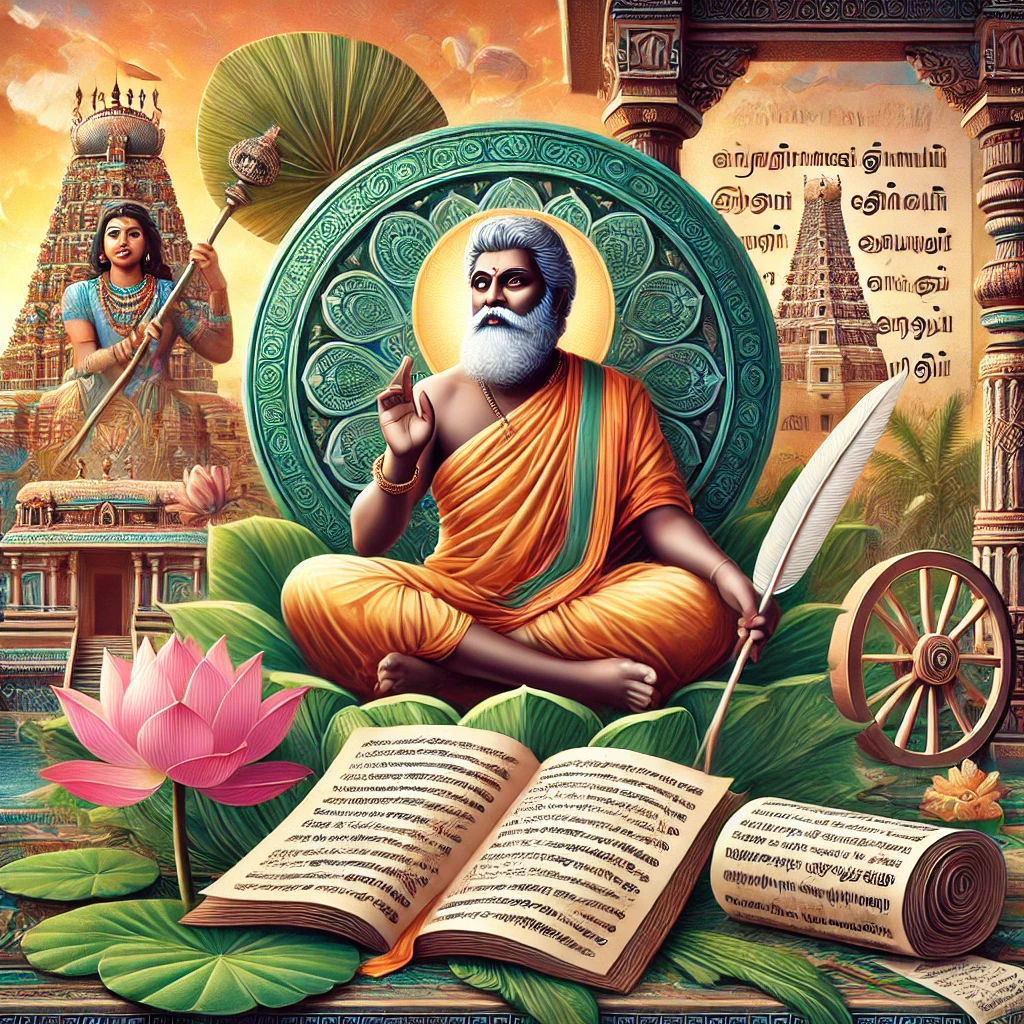The Thirukkural, composed by the Tamil poet and philosopher Thiruvalluvar over 2,000 years ago, is a timeless treasure of ethical guidance, moral values, and life philosophies. With its succinct couplets spanning universal themes, the Thirukkural stands as an unparalleled beacon of wisdom transcending cultural, temporal, and geographic boundaries. Let’s explore the profound philosophies embedded in this literary masterpiece and why it continues to inspire millions worldwide.
Contents
The Essence of Thirukkural
The Thirukkural, consisting of 1,330 couplets, is structured into three sections:
- Aram (Virtue) – Principles for leading a moral and righteous life.
- Porul (Wealth) – Guidelines on governance, politics, and earning wealth ethically.
- Inbam (Love) – Insights into love, relationships, and the joy of life.
Each couplet encapsulates profound wisdom in just two lines, making it one of the most concise yet comprehensive works of literature. Its universal appeal lies in its secular nature, as it refrains from religious bias and focuses on human values and ethics.
Philosophical Pillars of the Thirukkural
1. Aram: The Path of Righteousness
The first section emphasizes living a virtuous life. It extols qualities such as truthfulness, compassion, gratitude, and humility.
Key Couplets and Their Messages:
- “Pirapokkum ella uyirkkum sirappu” – All lives are equal, promoting equality and respect for life.
- “Vellathanaya malar neettam maanthar tham
uyyal uyarvu cheyal” – Like the height of water determines the height of a lotus, one's actions determine their worth.
The teachings of Aram resonate with modern ideals of social justice and equality.
2. Porul: Ethics in Worldly Affairs
The second section provides a pragmatic guide to managing wealth, leadership, and statecraft. Thiruvalluvar emphasizes integrity and justice in governance, qualities essential for societal harmony.
Key Philosophies:
- Leadership: A good ruler must prioritize the well-being of their people.
- “Ilanthondru thandondru paduthondru vandoruvan
vaanavam kedum arasu” – A ruler who listens to wise counsel ensures the prosperity of their kingdom. - Wealth: Wealth is vital, but it must be earned and utilized ethically.
- “Selvam selvathin neeyaamai annathu
uyirinum ondru adhuvi” – The misuse of wealth is more perilous than poverty itself.
3. Inbam: The Joy of Life
The final section delves into the personal aspects of human life, focusing on love, relationships, and familial bonds. Thiruvalluvar’s verses in this section are poetic yet deeply reflective of the human experience.
Themes in Inbam:
- The beauty of mutual love and respect in relationships.
- The balance between personal happiness and societal responsibilities.
“Kan tharum kirisaithul ellaam mukan tharum
muthal inbathu il” – The face of a beloved person is the ultimate source of joy.
The Universality of Thirukkural
Despite being deeply rooted in Tamil culture, the Thirukkural has universal relevance. Its teachings align with principles found in global philosophies like Stoicism, Confucianism, and the Bhagavad Gita. The focus on compassion, ethical leadership, and self-awareness echoes across cultures and eras.
| Theme | Thirukkural Insight | Global Equivalent |
|---|---|---|
| Virtue | Equality of all beings | Human rights in modern constitutions |
| Governance | Ethical leadership | Confucian ideas of moral rulership |
| Relationships | Mutual respect in love | Stoic emphasis on harmony in personal bonds |
Relevance in Modern Times
In today's fast-paced world, the Thirukkural offers clarity amid chaos. From promoting sustainability through simplicity to fostering empathy in a fragmented society, its teachings are more relevant than ever.
Practical Applications:
- Corporate Leadership: Ethical decision-making based on Porul.
- Personal Growth: Living a balanced life through the virtues of Aram.
- Civic Responsibility: Upholding justice and equality in societal roles.
Thirukkural’s Enduring Legacy
The Thirukkural has been translated into over 80 languages, a testament to its universal appeal. Scholars and leaders across the globe, including Mahatma Gandhi and Albert Schweitzer, have drawn inspiration from its philosophies.
Today, it continues to inspire educators, policymakers, and individuals, reminding us of the timeless values that bind humanity.
Final Thoughts
The Thirukkural is not merely a collection of couplets; it is a guide to leading a purposeful life. Its philosophies, rooted in compassion, justice, and wisdom, challenge us to strive for a better world. As we unravel its profound messages, we are reminded of the eternal truths that define human existence.
Whether you're a scholar, a leader, or someone seeking personal growth, the Thirukkural offers wisdom that transcends time. Embrace it, and let its teachings illuminate your path.






